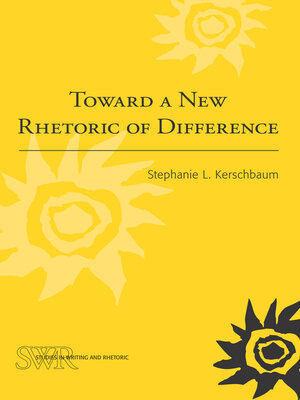Toward a New Rhetoric of Difference
ebook ∣ Studies in Writing and Rhetoric
By Stephanie L. Kerschbaum

Sign up to save your library
With an OverDrive account, you can save your favorite libraries for at-a-glance information about availability. Find out more about OverDrive accounts.
Find this title in Libby, the library reading app by OverDrive.



Search for a digital library with this title
Title found at these libraries:
| Library Name | Distance |
|---|---|
| Loading... |
Winner of the 2015 CCCC Advancement of Knowledge Award
Unlike much current writing studies research, Toward a New Rhetoric of Difference addresses conversations about diversity in higher education, institutional racism, and the teaching of writing by taking a microinteractional look at the ways people define themselves and are defined by others within institutional contexts. Focusing on four specific peer review moments in a writing classroom, Stephanie L. Kerschbaum reveals the ways in which students mark themselves and others, as well as how these practices of marking are contextualized within writing programs and the broader institution.
Kerschbaum's unique approach provides a detailed analysis of diversity rhetoric and the ways institutions of higher education market diversity in and through student bodies, as well as sociolinguistic analyses of classroom discourse that are coordinated with students' writing and the moves they make around that writing. Each of these analyses is grounded in an approach to difference that understands it to be dynamic, relational, and emergent-in-interaction, a theory developed out of Bakhtin's ethical scholarship, the author's lived experience of deafness, and close attention to students' interactions with one another in the writing classroom. Toward a New Rhetoric of Difference enriches the teaching of writing by challenging forms of institutional racism, enabling teachers to critically examine their own positioning and positionality vis-à-vis their students, and highlighting the ways that differences motivate rich relationship building within the classroom.







